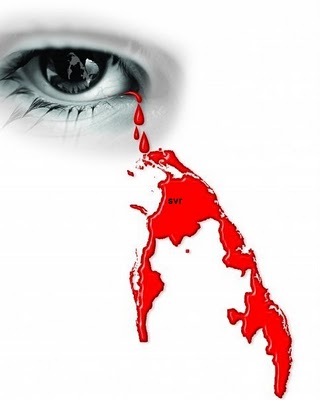
Six Sri Lanka Army (SLA) soldiers were taken into custody for allegedly molesting a nine-year-old Tamil girl at Ki'raan Vaazhaichcheani in the eastern Batticaloa district, sources in Batticaloa said. The victim identified one of the perpetrators during an identification parade held in Batticaloa Magistrate Court. Asian Human Rights Commission (AHRC) reported that the soldiers of the Digiliwatiya camp had threatened the protesting villagers, and the body of one protester was recovered in a pond near the SLA camp after the protests.
The victim "was returning home in the company of two of her friends when soldiers bathing near a well chased after her and raped her. The girl was admitted to a hospital and the medical reports confirmed that she had been sexually abused. It is also reported that the girl who is still being treated at the hospital is being questioned constantly by commando officers," AHRC report said.
The alleged incident happened on the 12th of February. The suspects have been remanded by the Batticaloa Magistrate until 3rd of March, legal sources in Batticaloa said.
When the issue of rape by SLA soldiers was raised by US Secretary of State Hilary Clinton, Sri Lanka's Defense Ministry website carried a refutation, saying "such sadistic allegations are far from the existing realities: far from the truth," and added that "there was no basis whatsoever even to suggest Sri Lankan forces had involved in such gross violence during its three-year humanitarian campaign."
British weekly, The Observer, in December 2009 said that "Tamil women interned after escaping the horrors of the civil war in Sri Lanka were sexually abused by their guards who traded sex for food," reporting on an interview with Vany Kumar, a British medic who was released from internment in September from the camps run by Sri Lanka military.
"Systematic rape of Tamil women in custody and in areas under control of Security forces, and sexual abuse of LTTE women cadres caught during combat, had occured from as early as September 1996 when Krishanthy Kumarasamy, a 17-year old highschooler, was murderd after being stopped and raped at an SLA sentry point at Kaithadi, Jaffna. Horrendous videos showing Sri Lankan soldiers abusing women cadres stripped naked have routinely surfaced," said activist for a Washington-based pressure group.
UN Resolution 1325
The link between maintaining international peace and security, and preventing and responding to sexual violence used as a tactic of war to target civilians was first laid out in last year's United Nation's Security Council resolution 1325.
United Nations charged 114 Sri Lankan soldiers who were on peace-keeping missions to Haiti in March 2008 with sexual exploitation and abuse against children. After an investigation into pending charges against Sri Lankan troops in Haiti, the UN's Office of Internal Oversight Services (OIOS) concluded that “acts of sexual exploitation and abuse [against children] were frequent and occurred usually at night, and at virtually every location where the [Sri Lankan] contingent personnel were deployed.”
